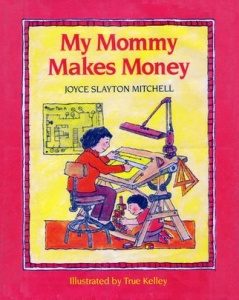Working Women’s Day
Listen to the Recess! Clip
| Author | John Cech |
| Air Date | 3/8/2000 |

Working Women’s Day Transcript
It’s International Women’s Day, a holiday in many countries around the world, as it should be in ours, where the events took place, in 1857, that over a century later lead, in 1977, to Unesco’s naming this day in honor of all women. The day was originally called International Working Women’s Day, in commemoration of the women textile workers who protested their low wages and horrific working conditions in New York City in the middle of the 19th century. The “working” was dropped from the title, I’m sure, because it was quickly realized that working and women are, in essence, synonyms, and have always been.
Given that fact, it seems unusual that the work women do figures so little as a subject in the books that we create for children, especially in this country. True, there are the frontier women, like Ma Ingalls in the Little House Books and Mrs. Baxter in The Yearling, who work their fingers to the bone. And there are historical novels about the New England mill workers of the 19th century and the terrible privations of their lives. But it wasn’t until the 1970s and 80s that some real consciousness was raised concerning women’s actual occupations. In a book by Joyce Mitchell from that period, that’s crassly if honestly titled, My Mommy Makes Money, for example, mothers are seen doing everything from designing buildings to plumbing their walls, from driving busses to fixing clothes driers.
My favorite book from this time or any time , is the 1982 runner up for the Caldecott award for best picture book of the year, Verna B. Williams’ A Chair for My Mother. It’s about a reconfigured nuclear family–a little girl, her mother, and her grandmother–who all live together in a small apartment in an unnamed city. The girl’s mother works as a waitress at a diner , and each night she and her daughter count her tips into a big glass jar–money they’re saving for a rainy day. That day comes quickly, only it’s not rain, but a fire that sweeps through their apartment–they escape unharmed, and only the jar full of coins survives from their belongings. Undaunted, they start their life again, and with the money, they buy the most important thing that they can to refurnish their world–an easy chair where Grandma can sit during the day, and where mother can collapse, exhausted, after hours on her feet and nap or curl up with her daughter and read a book. Not a rags to riches saga, but simple, tender pleasures. Which is how work is most days for most of us–what we do because we must and what we do so that we can do, for a few hours, what we love.